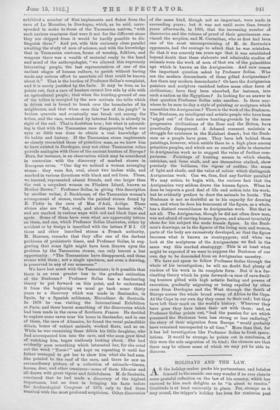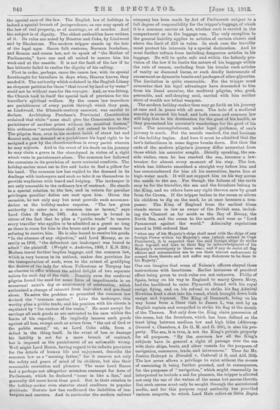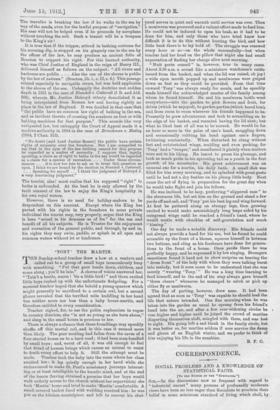HOLIDAYS AND THE LAW.
AS the holiday-maker packs his portmanteau and betakes himself to the seaside one may wonder if he ever rises to some grateful reflection on the law of his country, which has ensured to him such delights as he "is about to receive." Gratitude is at least eminently in place. For, strange as it may sound, the tripper's holiday has been for centuries past
the special care of the law. The English law of holidays is indeed a special branch of jurisprudence, as one may speak of the law of real property, or of marriage, or of murder. And the subject is of dignity. The oldest authorities have written of it. Its rules are noted by Bracton and Coke, by Lindwood and by Blackstone. The modern tripper stands up the heir of the legal ages. Saxon folk customs, Norman feudalism, and Roman and canon law, not to speak of "the Mother of Parliaments," have one and all united to ensure him his week-end at the seaside. It is not the fault of the law if he has hitherto failed to realize the dignity of his calling.
First in order, perhaps, came the canon law, with its special forethought for travellers in days when, Heaven knows, they needed it. The authority which ordained in the English Litany an eloquent petition for those " that travel by land or by water" could not be without care for the voyager. And, as was fitting, the Church took to itself the special task of provision for the traveller's spiritual welfare. By the canon law travellers are parishioners of every parish through which they pass, as Lindwood, the fifteenth-century canonist, was careful to declare. Archbishop Peocham's Provincial Constitution ordained that while " none shall give the Communion to the parishioner of another priest without his manifest licence," this ordinance " nevertheless shall not extend to travellers." The pilgrim then, even in his modern habit of straw hat and flannel suit, can demand as a parishioner his legal right to be assigned a pew by the churchwardens in every parish wherein he may sojourn. And in the event of his death on his journey he may claim a grave in the churchyard in virtue of a right which vests in parishioners alone. The common law followed the canonists in its provision of more material comforts. The holiday-maker must eat to live and looks to find a pillow for his bead. The common law has replied to the demand in its dealings with innkeepers and such as take it on themselves to provide wayfarers with board and lodging. The innkeeper is not only amenable to the ordinary law of contract. He stands in a special relation to the law, and in return for peculiar privileges peculiar duties are cast upon him. Given the occasion, he not only may but must provide such accommo- dation as the holiday-maker requires. "The law gives authority to enter into a common inn or tavern," says Lord Coke (8 Repts. 146). An innkeeper is bound in virtue of the fact that he plies a "public trade" to receive every traveller who applies to be admitted as a guest so long as there is room for him in the house and no good reason for refusing to receive him. He is also bound to receive his goods. "In the absence of any objection," said Lord Mereey, so re- cently as 1908, "the defendent (an innkeeper) was bound to admit" the plaintiff. (Wright v. Anderton, 1909, 1 K.B. 209.) Modern travel further implies luggage, and the common law, which is very human in its outlook, makes due provision for the transportation of suoh, even to the extent of gratifying the desires of the lady for whom Folkestone or Torquay has no charms to offer without the added delight of two separate toilets for each day of the visit. Possibly even the medieval pilgrim found the need for some form of impedimenta in an occasional saint's day or anniversary of celebration, which authorized a change of raiment from hair-shirt and pea-lined shoes. To solve the problem so presented the common law devised the " common carrier." Like the innkeeper, this worthy plies a public trade, and his position with his clients is regulated by " the custom of the realm." He must accept for carriage all such goods as are entrusted to his care within the limits of his capacity. He impliedly insures such goods against all loss, except such as arises from " the act of God or the public enemy," or, as Lord Coke adds, from a defect in the thing itself. In the event of loss or damage his liability is not for a mere breach of contract, but is imposed as the punishment of an actionable wrong. Well might Lord Bacon, having regard to its infinite provision for the details of human life and enjoyment, describe the common law as a "nursing father," for it ensures not only the safety and peace of mind of its children, but also their reasonable recreation and pleasure. The same Lord Bacon had a perhaps not altogether mistaken contempt for Lots of Parliament, which he declared "came in hke a lion," and generally did more harm than good. But in their relation to the holiday-maker even statutes stand creditors to popular gratitude. Statute law has reaffirmed the liabilities of inn- keepers and carriers. And in particular the modern railway
company has been made by Act of Parliament subject to a full degree of responsibility for the tripper's luggage, of which it is a common carrier at law, whether such is carried in the compartment or in the luggage van. The only exception to the general liability applies to articles of certain classes and above the limit of £10 in value. In such case the traveller must protect his interests by a special declaration. And he must further refrain from including dangerous articles in his luggage. He will be quite safe and within the fatherly pro- vision of the law if he limits the nature of his baggage within the rule of reason, excluding from his trunks such articles
of vanity as diamond tiaras, or such deadly instruments of amusement as dynamite bombe and packages of nitro-glycerine.
The limitation is quite reasonable. For the tripper must remember that his legal advantages have descended to him from his lineal ancestor, the medieval pilgrim, who, good, peaceable, and self-denying soul, carried with him neither store of wealth nor lethal weapons.
The modern holiday-maker then may go forth on his journey at ease and in peace with all men. The halo of a medieval sanctity is around his head, and both canon and common law will help him to his destination for the good of his health, as they guaranteed his ancestor's wanderings for the good of his soul. The accomplishment, under legal guidance, of one's journey is much. But the seaside reached, the real business of the holiday begins. And here it must be admitted that the law's fatherliness in some degree breaks down. But then the ends of the modern pilgrim's journey differ somewhat from those which his ancestor sought. Strictly speaking, the sea- side visitor, once he has reached the sea, becomes a law- breaker for almost every moment of his stay. The law, which has hitherto smoothed a straight way before him and has commandeered for him all his necessities, leaves him at high-water mark. It will not support him on his way across the sands to the sea. For though the fulness of the earth may be for the traveller, the sea and the foreshore belong to the King, and no others have any right thereon save by grant from the Crown. If the tripper bathes in the ocean or allows his children to dig on the sand, he at once becomes a tres- passer. The King of England from the earliest times stands secure in law as owner of the British seas, includ- ing the Channel as far south as the Bay of Biscay, the North Sea, and the ocean to the north and west as "Lord Paramount against the world." Admiralty regulations issued in 1805 ordered that
" when any of his Majesty's ships shall meet with the ships of any foreign Power within his Majesty's seas (which extend to Cape Finisterre), it is expected that the said foreign ships do strike their top-sail and take in their flag in acknowledgment of hie Majesty's sovereignty in those seas ; and if any do resist all flag officers and commanders are to use their utmost endeavours to compel them thereto and not suffer any dishonour to be done to his Majesty."
One can imagine that some of Nelson's officers obeyed these instructions with heartiness. Earlier instances of practical effect being given to such rules are not unknown. Philip of Spain, being on his way to England to marry Queen Mary, had the hardihood to enter Plymouth Sound with his royal ensign flying, and on his refusal to strike his flag Admiral Hawkins fired a shot into his vessel, which brought down both ensign and topmast. The King of Denmark, being on his way home from a State visit to James I., was met by an English captain and compelled to strike his flag at the mouth of the Thames. Not only does the King claim possession of the ocean, but the foreshore, which has been defined as the tract lying between medium low and high tides (Attoniey. General v. Chambers, 4 De G. M. and G. 206), is also his pro- perty. The sea, it is true, is not the King's private property for all purposes. " By the common law all the King's subjects have in general a right of passage over the sea with their ships, boats, and other vessels for the purposes of navigation, commerce, trade, and intercourse." Thus far Mr. Justice Holroyd in Blundell v. Catterall (5 B. and Ald. 294). The law never allows a privilege to exist without the means of exercising it being further granted, and in consequence, for the purposes of " navigation," which might reasonably be interpreted to include a. sail for pleasure, the tripper is allowed not only the use of the waters of the ocean but access thereto. But such access must only be sought through the accustomed media, and for this purpose royal authority has provided various seaports, to which Lord Hale refers as Os is .Regni.
The traveller is breaking the law if he walks to the sea by way of the sands, even for the lawful purpose of "navigation." His case will not be helped even if he proceeds by aeroplane without touching the soil. Such a transit will be a trespass to the King's air !
It is true that if the tripper, attired in bathing costume for his morning dip, is stopped on his gingerly run to the sea by the officer of the law, he may produce an ancient folio of Bracton to support his right. For this learned authority, who was Chief Justice of England in the reign of Henry III., delivered himself as follows on the subject: "All rivers and harbours are public. . . . Also the use of the shores is public
by the law of nations." (Bracton, lib. i., 0. 12, s. 6.) This passage related especially to navigable rivers, but was held applicable
to the shores of the sea. Unhappily the doctrine met sudden death in 1821 in the case of Blundell v. Callerall (5 B. and Ald.
268), wherein Mr. Justice Holroyd utterly demolished it as being interpolated from Roman law and having rightly no place in the law of England. It was decided in that case that "the public have no common law right of bathing in the sea, and as incident thereto of crossing the seashore on foot or with bathing machines for that purpose." This sounds like very antiquated law, but unhappily the Court of Appeal made it a modern authority in 1904 in the case of Brinckman v. Malley (1904, 2 Chan. 313).
"No doubt [said Lord Justice Romer] the public have certain rights of necessity over the foreshore. But I am compelled to say that in the eyes of the law bathing cannot for this purpose be regarded as a matter of necessity. I suppose that, legally speaking, a claim as of right to bathe in the sea would be regarded as a claim for a species of recreation. . . . Under these circum- stances . . . it is now too late to ask us to treat this question as open. I think wo are bound by the decision in Blundell v. Catterall. . . . Speaking for myself ... I think the judgment of Holroyd J. R very convincing judgment."
The tourist, alas! must realize that his supposed " right" to bathe is unfounded. At the best he is only allowed by the tacit consent of the law to enjoy the King's hospitality in his own royal waters.
However, there is no need for holiday-makers to be despondent on this account. Except where the King has
parted with his rights in the foreshore to some private individual the tourist may, very properly, argue that the King is here "seised in his demesne as of foe" for the use and benefit of all his subjects. He is Trustee for the enjoyment and recreation of the general public, and through, by and in, his rights they may swim, paddle, or splash in all open and common waters without let or hindrance.












































 Previous page
Previous page